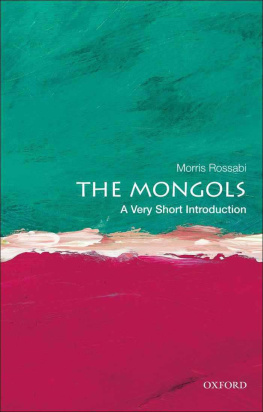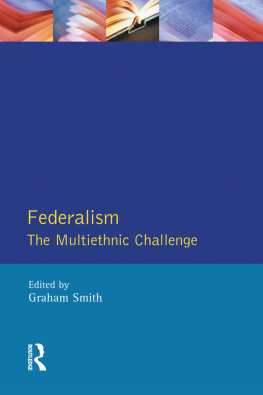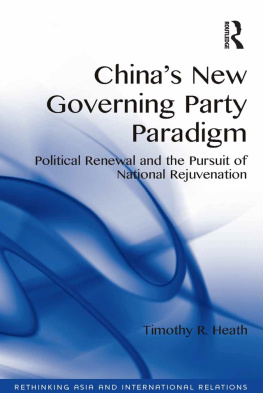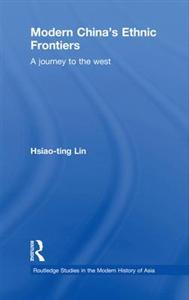STUDIES ON ETHNIC GROUPS IN CHINA
Stevan Harrell, Editor
HENRY M. JACKSON SCHOOL OF INTERNATIONAL STUDIES
STUDIES ON ETHNIC GROUPS IN CHINA
Cultural Encounters on Chinas Ethnic Frontiers
Edited by Stevan Harrell
Guest People: Hakka Identity in China and Abroad
Edited by Nicole Constable
Familiar Strangers: A History of Muslims in Northwest China
Jonathan N. Lipman
Lessons in Being Chinese: Minority Education and Ethnic Identity in Southwest China
Mette Halskov Hansen
Manchus and Han: Ethnic Relations and Political Power in Late Qing and Early Republican China, 18611928
Edward J. M. Rhoads
Ways of Being Ethnic in Southwest China
Stevan Harrell
Governing Chinas Multiethnic Frontiers
Edited by Morris Rossabi
GOVERNING CHINAS
MULTIETHNIC FRONTIERS
Edited by
MORRIS ROSSABI
In Memory of Michel Oksenberg
Copyright 2004 by the University of Washington Press
Printed in the United States of America
All rights reserved. No portion of this publication may be reproduced or transmitted in any form or by any means, electronic or mechanical, including photocopying, recording, or any information storage or retrieval system, without permission in writing from the publisher.
University of Washington Press
P.O. Box 50096-5096
Seattle, WA 98145, USA
www.washington.edu/uwpress
Library of Congress Cataloging-in-Publication Data
Governing Chinas multiethnic frontiers / edited by Morris Rossabi.
p. cm.(Studies on ethnic groups in China)
Papers presented at conference Chinas Management of Its National Minorities, held in Washington, D.C., Feb. 2001.
Includes bibliographical references and index.
ISBN 0-295-98390-6 (alk. paper)
1. MinoritiesGovernment policyChinaCongresses. 2. ChinaEthnic relationsPolitical aspectsCongresses. I. Rossabi, Morris.
II. Series.
JQ1506.M5G68 2004
The paper used in this publication is acid free and recycled from 10 percent post-consumer and at least 50 percent pre-consumer waste. It meets the minimum requirements of the American National Standard for Information SciencesPermanence of Paper for Printed Library Materials, ANSI Z39.48-1984.

Contents
MORRIS ROSSABI
1 /White Hats, Oil Cakes, and Common Blood
The Hui in the Contemporary Chinese State
JONATHAN N. LIPMAN
2 /The Challenge of Sipsong Panna in the Southwest
Development, Resources, and Power in a Multiethnic China
METTE HALSKOV HANSEN
3/Inner Mongolia
The Dialectics of Colonization and Ethnicity Building
URADYN E. BULAG
4/Heteronomy and Its Discontents
Minzu Regional Autonomy in Xinjiang
GARDNER BOVINGDON
5/Making Xinjiang Safe for the Han?
Contradictions and Ironies of Chinese Governance in Chinas Northwest
DAVID BACHMAN
MELVYN C. GOLDSTEIN
7/A Thorn in the Dragons Side
Tibetan Buddhist Culture in China
MATTHEW T. KAPSTEIN
Preface
The essays presented in this volume evolved from a conference that was inspired by conversations between Michel Oksenberg of Stanford University and myself in 1999. Professor Oksenberg suggested that I invite leading specialists on the minority minzu (ethnic groups) of China to write essays appraising the Chinese governments administration of the minority regions, an important lacuna in studies of modern China. After discussions with colleagues at Stanford and Columbia Universities, I invited the prospective authors to provide overviews of state relations with the minority peoples since the founding of the Peoples Republic of China in 1949, analyze the present status of these relations, and suggest policy alternatives for the United States if crises should erupt in a minority region. For publication in the Studies on Ethnic Groups in China series, we have eliminated the U.S. policy dimension.
The conference, titled Chinas Management of Its National Minorities, convened in Washington, D.C., in February 2001. The authors met for three days to discuss papers that had circulated well in advance of the meetings to suggest revisions. After the conference, I reread the papers and suggested additional revisions to each author. Later, we made further adjustments in response to comments by those who evaluated the manuscript for the University of Washington Press. These published essays are thus the result of several rounds of criticism and refinement.
Professor Oksenbergs interest in the conference persisted until the onset of his final illness. His contributions to this particular project and to so much else in the field of Chinese studies were so manifold that the authors wish to dedicate this work to his memory. He helped conceive the project, and he actively supported efforts to locate funding for the conference. For this assistance, the authors are grateful.
The Smith Richardson Foundation provided a grant for the conference, a subvention that facilitated our work. Dr. Samantha Ravitch, its former program officer for East Asia, assisted enormously in planning the conference. The Asia Society and its vice president for public and corporate programs, Robert Radtke, administered the grant efficiently and supplied much-appreciated logistical support.
The authors benefited from the suggestions of Stephen Kotkin of Princeton University and Pamela Crossley of Dartmouth College, who acted as discussants at the conference. Professor Kotkin, a historian of Russia, offered comparative insights, and Professor Crossley, a specialist on Qing China, provided historical context.
Morris Rossabi
City University of New York
Columbia University
September 2003
GOVERNING CHINAS
MULTIETHNIC FRONTIERS
Introduction
MORRIS ROSSABI
Since the first identifiable and attested dynasty in the second millennium B.C.E., China has gradually expanded from its original base along the bend of the Yellow River to incorporate additional territory and to rule over other people. Each accession of land has translated into the absorption and gradual assimilation of native peoples, who have themselves contributed cultural or linguistic traits to the dominant group. Even if a foreign kingdom or khanate managed, through superior weapons or tactics, temporarily to occupy parts of China, it needed, according to historians, to adopt and use Chinese institutions in order to rule. On the other hand, when China acquired land at the expense of other groups, the natives on occasion preserved their unique traditions and institutions, challenging the Chinese dictum that they would naturally assimilate.
Nonetheless, as the Han (206 B.C.E.C.E. 220), Tang (618907), and other great dynasties gained power, the official ideology of a culturally superior China, surrounded by less sophisticated peoples, developed. According to this view, as the non-Chinese (or non-Han, with Han coming to signify the dominant, ethnically Chinese population) recognized the glory of Chinese civilization and the brilliance and goodness of the Chinese emperor, they would gravitate toward the Chinese court and seek to integrate into Chinese civilization; in the Chinese formulation, they would come to be transformed. The wiser and more virtuous the Chinese ruler, the greater the number of foreigners who acquiesced to Chinese governance and adopted Chinese ways. Even the embodiments of steppe nomadic culture such as the Khitans (who established the Chinese-style Liao dynasty, 9071115) and the Mongols (who founded the Chinese-style Yuan dynasty, 12711368) were reputedly entranced by Chinese civilization, and some assimilated with the Han population. Yet the survival of such groups as the Mongols belies the Chinese view that foreigners, many of whom were nomadic pastoral peoples residing north of China, sought integration with China because of its more advanced economy and culture. Instead, relations between China and its northern neighbors alternated between trade, disguised as tribute offerings to the Chinese emperor, in the capital and commerce along the frontier. Unlike its policy in the north, China strenuously attempted to incorporate the non-Chinese peoples of the southwest into the Middle Kingdom.













